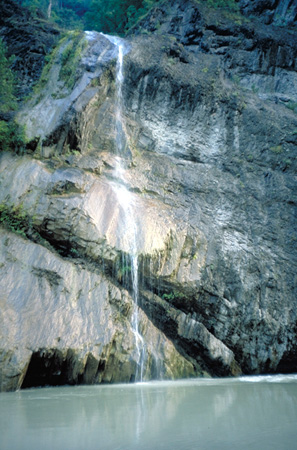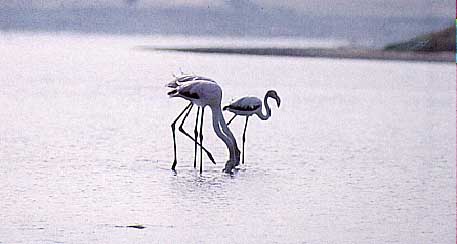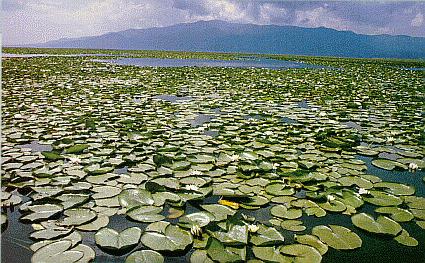
Wetlands' values
Every natural or artificial area, in which sweet or salt waters are gathered , is designated “wetland”. Characteristic examples are bogs, lagoons, lakes and rivers. Under the term “values” we mean all the products or utilities we can get from wetlands.
Biological values. This term integrates all that man can get to cover some of his biological needs. There is a variety of species (animals, plants, microorganisms) that can be met in these ecosystems. Much of our food is derived from wetlands, either cultivated or in wild condition; plants, herbals, food, such as rice or some animals (fish) for example. In health sector many drugs are based upon herbals that thrive in wetlands. Furthermore we get reeds and wood that we use for many purposes, like making mats, baskets, clothing and furniture.
Wetlands can be discerned to those with static waters and those with running waters.
Water supplying. What is mostly appreciated in wetlands is this value. We get fresh water from rivers and lakes so people must take care of them and not pollute them.
Irrigating. It is very important because the ability to irrigate is substantial to the agricultural economy. Without water to irrigate our fields wouldn't thrive, resulting in a poor harvest.
Fishing value. Many fish thrive in lakes, lagoons and rivers. The advantages are great, from financial to environmental, and this is another reason why we should protect these ecosystems. The underwater vegetation shouldn't be destroyed because they become the fish's food which, on their turn become food for other animals. This constructs a fragile balance, the environmental chain, where every creature has an important role. Fish that can be found in Greece's wetlands are bass fish, mullets, eels and giltheads.
 Cattle breeding. Many wetlands are rich grazing lands for cows and sheep and of course, they offer water for drinking. Additionally the nearby forests give refuge to many animals against harsh weather conditions.
Cattle breeding. Many wetlands are rich grazing lands for cows and sheep and of course, they offer water for drinking. Additionally the nearby forests give refuge to many animals against harsh weather conditions.
Quarries. Hunting is a very popular activity. Unfortunately as it is organized in Greece it is harmful to the fauna of the region. Many hunters kill animals in an uncontrollable way. People have no right extinguishing other living beings. On the contrary, they must protect every life, which, as has already been mentioned, represents a ring in the fragile chain of environmental balance.
Woodcutting. We have already mentioned that reeds and wood give us a good material for several constructions. It is noteworthy that ancient Egyptians used reeds to build houses, and papyrus taken from wetlands' trees for many purposes.
Hydroelectric energy. We can get energy supply from Mountain Rivers. Hydroelectric energy is a clean type of energy because it causes no pollution. By making dams we can distribute water for irrigating and producing energy as well.
Salt gathering. The coagulation of the sea is done in special formed coasts, the salt marshes, in which salt can be derived. A salt marsh is a complex of 3 or 4 artificial lagoons. Greece has about 28 salt marshes today.
Sand gathering. Among the inorganic matters that a river carries is sand, which can be used for building purposes.
Scientific value. Every day even more wetlands attract scientists' interest. They inquire the lands, they study their function and finally they index and classify them.
 Education. The legislation and implementation of environmental education brought about a revolution in education. Teachers and students make excursions, depictions, studies and inquiries about environmental issues. They play a more energetic role in what is called environmental awareness. The study and acquaintance with wetlands gives them the opportunity to get familiar with the cycle of the water, the specific conditions in which wetlands function, the relations between species and how the environmental balance is accomplished. They acknowledge the morphology and geography of the areas, the flora and fauna and they learn to respect nature and its values, while the negative consequences of technological exaggerations are underpinned.
Education. The legislation and implementation of environmental education brought about a revolution in education. Teachers and students make excursions, depictions, studies and inquiries about environmental issues. They play a more energetic role in what is called environmental awareness. The study and acquaintance with wetlands gives them the opportunity to get familiar with the cycle of the water, the specific conditions in which wetlands function, the relations between species and how the environmental balance is accomplished. They acknowledge the morphology and geography of the areas, the flora and fauna and they learn to respect nature and its values, while the negative consequences of technological exaggerations are underpinned.
Cultural value. Wetlands are closely related to the history and culture of the nearby areas. Myths, religion, literature, folklore and generally the history pay witness to the importance of the wet element. Greece's mythology is a strong example, with the nymphs, the hamadryads, the water gods, the river gods and plants that are elegantly scattered through the nation's whole ancient history. Additionally, Greek folk songs mention very often this relation.
Leisure. There are passive and energetic activities in wetlands. Passive activities are photography, bird watching, relishing the view. Energetic activities are cycling, canoeing, rowing, diving, horse riding.
Finally the rivers that are left untouched from harmful human intervention pay an important role in flood preventing, as they constrain the waters that rainstorms produce.
Takis Psiharakis
Nikos Kriaras
Christos Venetis
Valantis Kotoulas
6th grade students

home page

 Cattle breeding. Many wetlands are rich grazing lands for cows and sheep and of course, they offer water for drinking. Additionally the nearby forests give refuge to many animals against harsh weather conditions.
Cattle breeding. Many wetlands are rich grazing lands for cows and sheep and of course, they offer water for drinking. Additionally the nearby forests give refuge to many animals against harsh weather conditions.  Education. The legislation and implementation of environmental education brought about a revolution in education. Teachers and students make excursions, depictions, studies and inquiries about environmental issues. They play a more energetic role in what is called environmental awareness. The study and acquaintance with wetlands gives them the opportunity to get familiar with the cycle of the water, the specific conditions in which wetlands function, the relations between species and how the environmental balance is accomplished. They acknowledge the morphology and geography of the areas, the flora and fauna and they learn to respect nature and its values, while the negative consequences of technological exaggerations are underpinned.
Education. The legislation and implementation of environmental education brought about a revolution in education. Teachers and students make excursions, depictions, studies and inquiries about environmental issues. They play a more energetic role in what is called environmental awareness. The study and acquaintance with wetlands gives them the opportunity to get familiar with the cycle of the water, the specific conditions in which wetlands function, the relations between species and how the environmental balance is accomplished. They acknowledge the morphology and geography of the areas, the flora and fauna and they learn to respect nature and its values, while the negative consequences of technological exaggerations are underpinned.